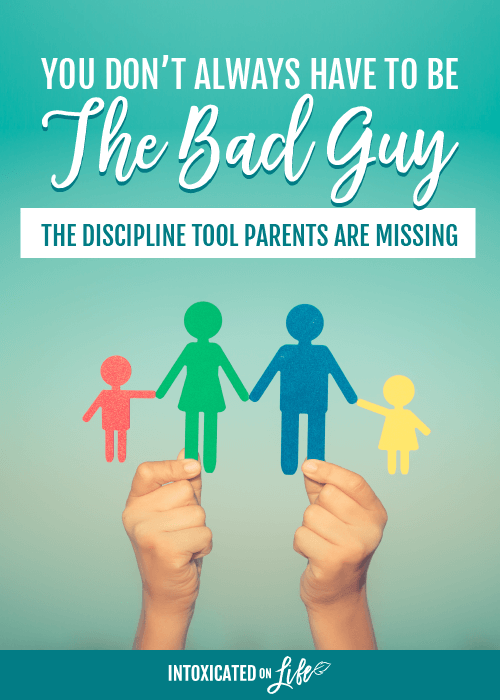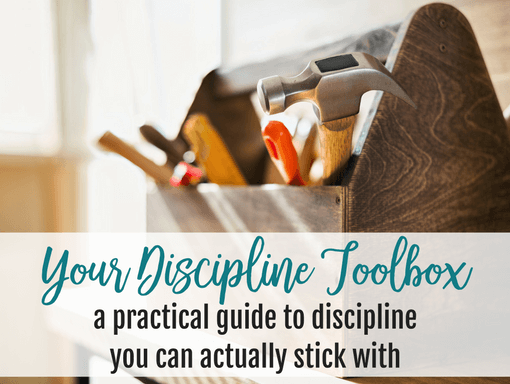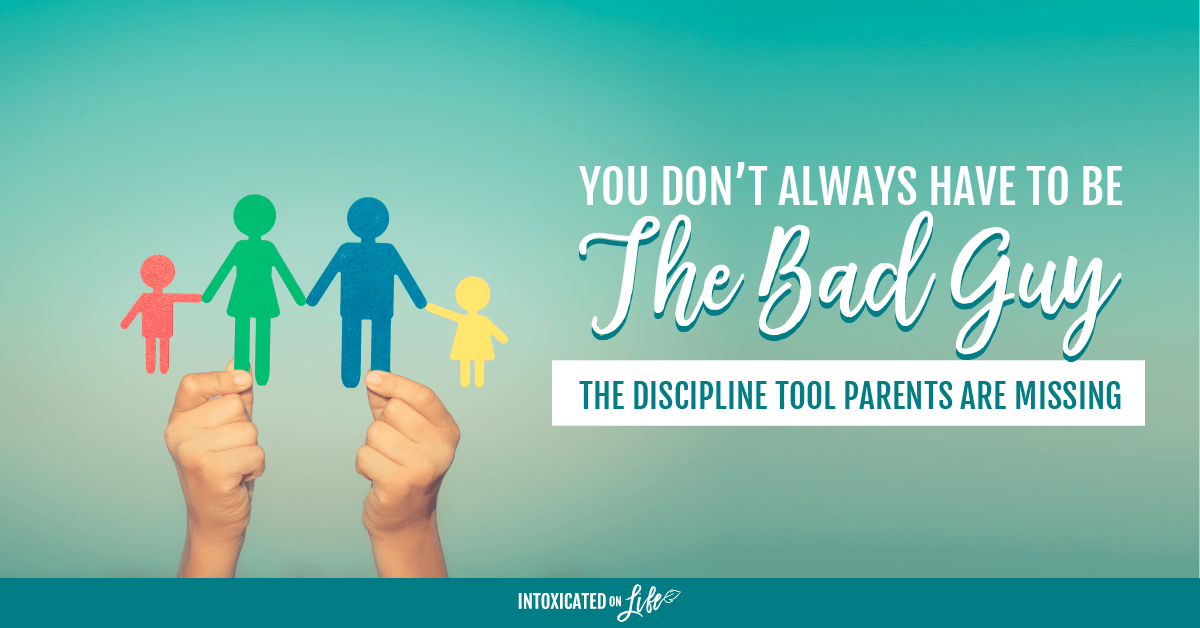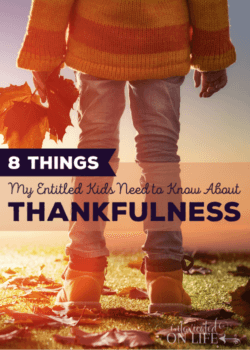My oldest son had a particularly busy end week with basketball games and practices. I reminded him at the beginning of the week: he needed to be sure to stay on top of his schoolwork and other responsibilities around the house early in the week so he didn’t get behind and overwhelmed later in the week. Tuesday hit, and it all started to unravel.
One bad day was all it took. One day where he was distracted. One day where he got behind on his work set him up for failure the rest of the week.

When he got a call Friday afternoon from a friend, asking if he could spend the night after his basketball game, he had to decline. Unfortunately, he had to spend Saturday catching up on his schoolwork he got behind on throughout the week.
I wanted to bail him out. I knew he’d had a busy week. I wanted him to enjoy a weekend with friends.
But I’m glad I resisted the urge. He learned a valuable lesson. Actions have consequences. The consequence of not being diligent with his work meant he wasn’t able to enjoy his weekend.
One, all too common, discipline mistake we as parents make is neglecting the tool of natural consequences. We’re often too quick to rescue our kids from the natural implications of their bad decisions or foolishness.
Natural Consequences: What they are and what they are not.
Natural consequences aren’t the only tool in a parent’s discipline toolbox—I can think of at least 6 tools (see below)—but consequences are an important and often neglected tool.
A natural consequence is simply the result or outcome of something a child does.
A natural consequence is not a parent-imposed punishment. A natural consequence is not requiring a child to make amends. These are just other types of discipline.
It’s a type of discipline where you don’t have to be the bad guy! How cool is that?
A natural consequence is built into the natural world by God. It is a “reap what you sow” principle—a simple cause-effect relationship we see in both the Bible and everyday life.God often uses natural consequences in the Bible.
- Abraham had to face consequences of having a child with his servant Hagar. Samson had to deal with the natural consequences of foolishly entrusting himself with Delilah. God didn’t rescue these leaders from the consequences just because they were part of his special people.
- If you choose to keep company with bad people, their morals will inevitably rub off on you. “Bad company corrupts good morals” (1 Corinthians 15:33).
- Getting caught in a lie means people will think you are not trustworthy. “Truthful lips endure forever, but a lying tongue is but for a moment” (Proverbs 12:19).
- If you’re lazy and fail to make money, you don’t get to buy the things you want. “The soul of the sluggard craves and gets nothing, while the soul of the diligent is richly supplied” (Proverbs 13:4).
There are many examples of natural consequences in our kids lives…
- Your toddler throws their food on the floor and refuses to pick it up, so they don’t eat it and feel hungry before the next meal.
- Your child leaves their coat at school, so the next time they wants to go outside, he is cold.
- Your child doesn’t study for a test, so they gets a poor grade.
- Your son fails to wash his basketball uniform, so he has to wear a smelly uniform to the game.
- Your daughter wakes up late and doesn’t have time to eat breakfast, so she is hungry until lunch time.
Why We Come to the Rescue
This is a tool every parent uses because it involves literally no extra actions on our part—right? It’s just automatic. We just “let the chips fall” and allow the pain or pressure of the situation to reinforce a needed lesson.
Wrong. Many parents often either don’t use natural consequences as part of the discipline toolbox, or neglect to use them effectively.
The problem is, we often have a knee-jerk reaction to protect our kids from failure and pain. We feel anxious. We don’t want to see our kids fail.
Dr. Deborah Gilboa wisely says many of the natural consequences parents are trying to prevent—”unhappiness, struggle, not excelling, working hard, no guaranteed results—are great teachers for kids and not actually life-threatening. It just feels that way.”
Why do parents prevent natural consequences?
Reason #1: We overestimate the threat.
If your child forgets his coat, will he get cold? Yes. Will he die? Highly unlikely. If your child doesn’t study, will he get a poor grade. Probably. Will he flunk out of school? Not after one test. Don’t have such an inflated sense of threat.
Even in more extreme cases, especially with older kids or adult children, we as parents need to fight the urge to always bail our kids out of serious problems because the consequences are severe (losing a job, going broke, drug addiction, etc.). It is important to remember that sometimes “rock bottom” is the best place for a child to learn.
Reason #2: We don’t want to look like bad parents.
Often, the reason we clean up their messes or cushion their falls is because we don’t want our kids to look like they are failing at something—because then we will look like we are failing at parenting.
When we contest our child’s grade, second-guess coaches and refs, and constantly rush to our child’s defense, it make us feel like a good parent. When our kid gets an A because we basically did the project for them, we have done our them a great disservice—but at least you’re the parent of a child who got an A. It’s a parenting ego trip.
When NOT to Use Natural Consequences
1. When a child is in danger – Don’t allow a child to experience the natural consequences of playing in a busy street. If a teenager’s car runs out of gas, it’s probably not best to allow them to experience the natural consequences of walking to a gas station in the seedy end of town.
2. When natural consequences interfere with the rights of others – Parents should not allow the natural consequences their child punching another child, for instance.
3. When children can’t see the longterm consequences – Sometimes kids can’t see why their choices are bad because the consequences are too far down the road, this is especially true with young children. Parents should not allow a child to experience the natural consequences of never brushing their teeth or always eating sugary junk food, for example.
Natural consequences shouldn’t be the only type of discipline in your toolbox, but it’s one of the often neglected tools that is forgotten by parents.
Don’t Raise Failure Deprived Kids
When we try to engineer failure out of our kids’ lives, we end up raising “failure deprived” kids (that’s what Stanford and Harvard started calling them over a decade ago).
Failure deprived kids believe life should simply go their way. They are kids (who grow up to adults) with attitudes of entitlement, anxiety, and an inability to cope with the simplest struggles.
Failure teaches responsibility. Use it.
Your Discipline Toolbox
Natural consequences are just 1 of 6 possible means of discipline we can use in our child’s life. There are times natural consequences aren’t appropriate or aren’t immediately obvious. In those cases, we need to use some of the other tools.
We did a training event for parents called Your Discipline Toolbox: a practical guide to discipline you can actually stick with.













Leave a Comment